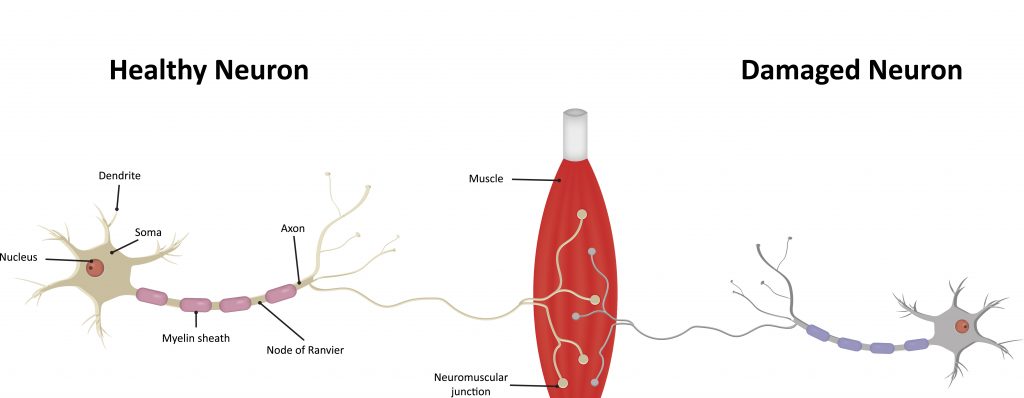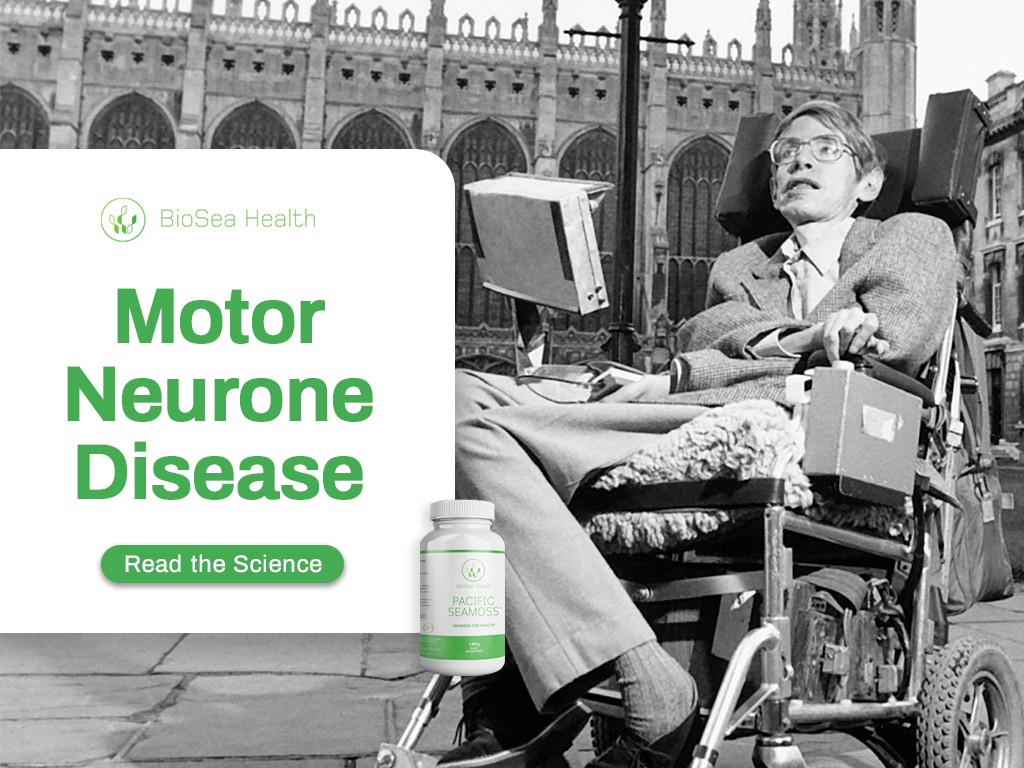Motor neuron disease has no cure. Seaweed slows progression, repairs brain damage, and reduces decline.
What is Motor Neurone Disease?
Motor neurone disease is also known as amyotrophic lateral sclerosis or Lou Gehrig’s disease. Approximately 1400 people in Australia are living with this disease. MND typically affects people in their mid-50s and survival is approximately 2-5 years from the onset of symptoms. Although there is currently no cure for MND, an anti-glutamatergic medication is available and slows the progression of the disease.. It is a devastating neurogenerative disorder that affects and destroys the motor neurons in the brain and spinal cord. Motor neurons are nerve cells that control essential voluntary muscle activities such as walking, speaking, swallowing, and breathing.
 When motor neurons are destroyed, the messages they send out to the muscles start to stop reaching the tissues progressively. Muscles stiffen, weaken, and eventually waste away. As the disease progresses, the affected person starts to lose their ability to do necessary muscular activities such as talking, walking, breathing, and eating.
When motor neurons are destroyed, the messages they send out to the muscles start to stop reaching the tissues progressively. Muscles stiffen, weaken, and eventually waste away. As the disease progresses, the affected person starts to lose their ability to do necessary muscular activities such as talking, walking, breathing, and eating.
Presently, there is no cure or standard treatment for motor neurone disease. People suffering from motor neurone disease are provided with supportive treatment to make them more comfortable while maintaining their quality of life. Other forms of treatment are symptomatic, whereby the therapy focuses on visible symptoms such as respiratory therapy to aid in breathing, and physical therapy to help in limb movement.
What causes motor neuron disease?
About 10 percent of all cases of motor neurone disease is inherited. In contrast, the remaining 90 percent of motor neurone disease cases are thought to be caused by toxic, environmental, viral, or genetic factors.
What are the symptoms of motor neuron disease?
During the early stages of motor neuron disease, the symptoms of the disease may be similar to those of other conditions, which may complicate diagnosis. However, typical symptoms of this disease mostly start in the mouth, arms, and legs, as well as the respiratory system. Some of the identified symptoms include a weakened grip that makes it challenging for a person to pick up and hold things. Muscle cramps, muscle pains, and twitches, fatigue, trouble breathing, or shortness of breath may also be present. Slurred speech, difficulty swallowing add to the challenges — odd emotional responses like laughing or crying, and weight loss due to muscle wasting.

What are the neuro-protective effects of seaweed?
There is significant evidence that oxidative stress has a considerable impact on the role in the progression of motor neurone disease. Oxidative stress is defined as the imbalance between the production of free radicals and the body’s ability to detoxify their harmful effects through neutralization by antioxidants. Oxidative stress is known to impair the architecture and function of cells, which may lead to various chronic neurodegenerative diseases such as motor neuron disease.
Seaweeds possess antioxidant polysaccharides. These have been found to slow down damage to the motor neurons, improve cognitive and motor functions, and reduce cognitive and motor decline in a range of neurodegenerative disorders. The polysaccharides found in seaweeds have been reported to have potent reducing power and can scavenge on the free radicals. Seaweeds also contain fucoxanthin, which is a carotenoid that is considered as a powerful antioxidant and is thought to play a significant role in brain injury. Research has shown that taking foods rich in antioxidant ingredients such as seaweeds has excellent potential in preventing conditions related to oxidative stress.
You might also like these articles:
1. Health Benefits of Seaweed. 8 Things You Should Know
2. Improve Heart Health
3.Cancer Fighting Properties in Seaweed
For more questions visit FAQ
References
- https://www.ncbi.nlm.nih.gov/pmc/articles/PMC4026683
- https://www.ncbi.nlm.nih.gov/pubmed/28968365
- https://www.ncbi.nlm.nih.gov/pubmed/28003344
- https://www.ncbi.nlm.nih.gov/pubmed/28003344
- https://www.ncbi.nlm.nih.gov/pubmed/25299277

